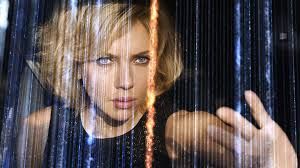
Looking for a low-level break from your usual high-level philosophizing about science? Check out Luc Besson's latest: a sci-fi shoot-em-up titled *Lucy* that will keep you crunching popcorn without straining too many neurons.
Okay, it's not really the thinky movie it thinks it is, but it's fun, and the premise is terrific (spoiler alert, obviously).
Our story begins with Lucy, the Australopithecus, sipping water from a primordial stream: hey, look how far make-up has come since *Space Odyssey*! (Plot ideas, not so much; this movie's most interesting parts are *Space Odyssey* on training wheels). Flash forward three million years to Scarlet Johansson as another Lucy, this one a modern-day dimwit who becomes entangled in an evil Japanese scheme to sell a new designer drug. The drug -- it's not clear how the bad guys missed this before they decided to mass-market it -- inadvertently causes people who take it to start utilizing more and more of their untapped cognitive potential. You may remember a similar premise from the 2011 movie *Limitless,* in which . . . well, exactly that.
This time, the bad guys stash a bag of the stuff in poor Scarlet Johansson's abdomen, turning her into a detection-free drug mule. Even worse, halfway to her destination a sadist starts beating her up, kicking her so hard in the gut that the bag full of crystals begins to leak . . .
That's the most intimidating moment of the movie right there, actually. Lucy's enforced participation in these gruesome proceedings; the savagery of the thugs, coupled by the icy sociopathy of the kingpin; it's scary stuff. At exactly this point, however, our suspended disbelief plummets as we dive into what has become the bane of Hollywood thrillers: the whiz-bang CGI sequence. Racing through Lucy's capillaries *Incredible Spider-Man* style, we see what would have been obvious anyway: the leaked drug is infiltrating her brain, causing amazing physiological changes. (The first of these, oddly, is an anti-gravity seizure.)
How we got from "she's becoming more intelligent" to "she's floating on the ceiling" is anyone's guess -- or, rather, it's up to Morgan Freeman, in his usual wise mentor role, to inform us via a series of wildly unscientific lectures. Among the groaners:
The notion that humans only use 10 percent of our brains. Why do so many people think this is true? There isn't a 90 percent block of gray matter that's just sitting in our skulls, not functioning. This movie claims to be about human evolution -- and interrupts itself frequently to montage about the effects of evolving intelligence in the cosmos -- but isn't all that clear on how brains actually evolve. To quote a Scientific American article on this misperception: "Though an alluring idea, the '10 percent myth' is so wrong it is almost laughable . . ."

If you had access to 20% of your brain, science-Morgan tells us, "you could control your own body." (A bit of a head-scratcher: don't humans control their bodies right now? And why does Lucy start having eyeballs from other species?) At 30% you can control other people's bodies as well; next comes telekinesis, morphing, and on up to time travel. How science-Morgan concluded any of these things is left out of the script, probably wisely; just play along.
Religion also gets smooshed in here too, though in a rather perfunctory way: "You never really die," Lucy informs a mere mortal at one point. "I only hope we are worthy of your sacrifice," science-Morgan sighs, as she heads toward her humanity-saving apotheosis. There isn't much of Lucy-as-Savior, though: mostly she kicks ass and shoots guns.
The real fun, however, isn't any of that -- it's in the premise of a dumb, abused woman who quickly becomes not only smart, but smarter than her abusers, then smarter than the police chasing her, the scientists studying her, and everyone else on earth. In a way, we owe all such stories to Arthur Conan Doyle, whose hyper-perceptive detective set the standard (If you doubt the enduring influence of Sherlock Holmes, I would point you toward the Robert Downey Jr. movies, the PBS re-runs of the magnificent Jeremy Brett, the runaway British success *Sherlock*, the American TV shows *Elementary* or *The Mentalist* or even *House* . . . among still others.)
Now it's Lucy, who can out-think the rest of us with ease as she evolves up the Kurzweil ladder of rapidly accelerating intelligence. If only the movie stayed with that idea, which is something that is actually on the way -- technologically enhanced super-intelligence, when we boot-strap ourselves into another evolutionary phase altogether -- instead of the magical stuff. As Mr. Spock, an earlier Sherlock Holmes knock-off, would have said, that's fascinating.

credit: public library toronto